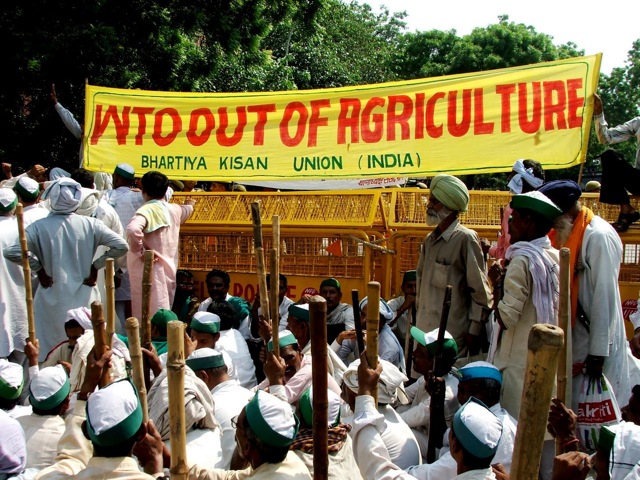 Director General of World Trade Organisation (WTO), Roberto Azevedo, is in Delhi, on 8-9th of February 2017. Indian farmers’s groups have written an open letter citing numerous instances of violations of their rights brought about by ujnust policies of the trade body. Here is the full text:
Director General of World Trade Organisation (WTO), Roberto Azevedo, is in Delhi, on 8-9th of February 2017. Indian farmers’s groups have written an open letter citing numerous instances of violations of their rights brought about by ujnust policies of the trade body. Here is the full text:
Dear Mr. Azevedo,
On the occasion of your visit to India, we are sending this letter on behalf of the major farmers’ organisations of India to express our deep frustration and concerns about the way agricultural negotiations have been moving at the WTO. Together, we represent the largest farmer’s alliance spread across the country. India, as you know is a nation that still depends heavily on its agriculture sector with 800 million dependent on agriculture who feed a population of over 1 billion.
Since the Agreement on Agriculture was signed in 1995, there has been attempt to cut agricultural tariffs even for developing countries. Farmers in developing countries such as India work under very difficult circumstances without much support from their governments, and need the protection the import duties offer. Developing countries are required to cut more duties under the formulae being considered and special and differential treatment is being weakened with every round of negotiations, with disastrous implications for Indian farmers very lives. There is already a grave agrarian crisis and rising levels of farmers suicides in India.
On the other hand, the huge domestic subsidies that the Western countries give to their farm sector, which is dominated by agri-business and not small farmers such as in India, are going unchallenged. The US gives 57,901 USD per farmer as applied domestic support, the EU gives 8,286 USD. In comparison Indian farmers get only 99 USD per farmer. This huge inequity has not been addressed at the WTO. Any talk on domestic support has been scuttled by the rich countries with the tacit support of the DG’s office.
To add to the affront, the small amount of subsidy we receive is now being challenged at the WTO. Our farmers receive nominal support through the administered price, for supporting our public food programme. These support prices barely cover the cost of production in almost all the 26 crops that it is applicable to. We also receive nominal input subsidy. All these, despite being nominal, are now being threatened under WTO’s imposed conditions. Let us remind you and the OECD that developing countries including India do not give the major share of “trade distorting subsidies”, as you often call it. The US gives out 44% of its value of production as applied domestic support.
The Peace Clause that is granted on the Food Security Proposal is not effective and it is not a guarantee against disputes. We are standing on very precarious grounds here our basic survival as farmers is being challenged, which also threatens the country’s food security and our people’s right to food. We need movement on a permanent solution on the food security proposal.
The so called achievement on export measures during the Nairobi Ministerial of 2015 was hailed as a major breakthrough by the WTO. But for us, export subsidies have decreasing importance, and the key issue remains that of unfair and very different set of rules on domestic subsidy for rich and poor countries.
The WTO has not been able to deliver on a Special Safeguard mechanism (SSM) either, in spite of efforts by the G-33 during the Nairobi Ministerial. This is of tremendous importance to us as we face threats from import surges which wipe out the livelihoods of millions of farmers in India in one go.
With a coastline of over 8000 kilometres, fisheries form an integral part of India’s primary sector, one that we see as a provider of essential food and livelihoods. India’s fisheries consists of numerous small fisher-folk who work under informal and very harsh conditions. It does not represent a major industrial sector for us. Currently we are alarmed to hear that fisheries subsidies are to be disciplined, without respecting the principle of special & differential treatment. We will not support any move to eliminate the small subsidies that our fishing and farm sectors receive.
The above goes to show why a majority of farmers groups across the world have taken a position to take agriculture out of the WTO. The Agreement on Agriculture(AoA) was promised to developing countries’ farmers, most of whom are small and marginal, as one that would help them export more and help grow their agriculture sector. The reality however is exactly the opposite. Not only did we not get any support from the WTO, we are being attacked and our very survival is at stake.
We ask you, what have you done for farmers in India, and other developing and least developed countries? Why do you want to unleash new issues like investment which will further threaten our access to land, water and essential natural resources to grow food? Why has the WTO still not delivered on agriculture issues under the WTO’s development mandate? We are asking you to tell us why farmers in India should support an institution like the WTO?
Endorsed by,
Indian Co-ordination Committee on Farmers Movements
1.Bharatiya Kisan Union (BKU)
2. Karnataka Rajya Raitha Sangha (KRRS)
3. Tamil Nadu Farmers Association (TVS)
4. Kerala Coconut Farmers Association
5. South Indian Coordination Committee of Farmers Movements (SICCFM)
The accompanying photograph is from an anti-WTO protest in 2009, organised by Bharatiya Kisan Union in New Delhi.
